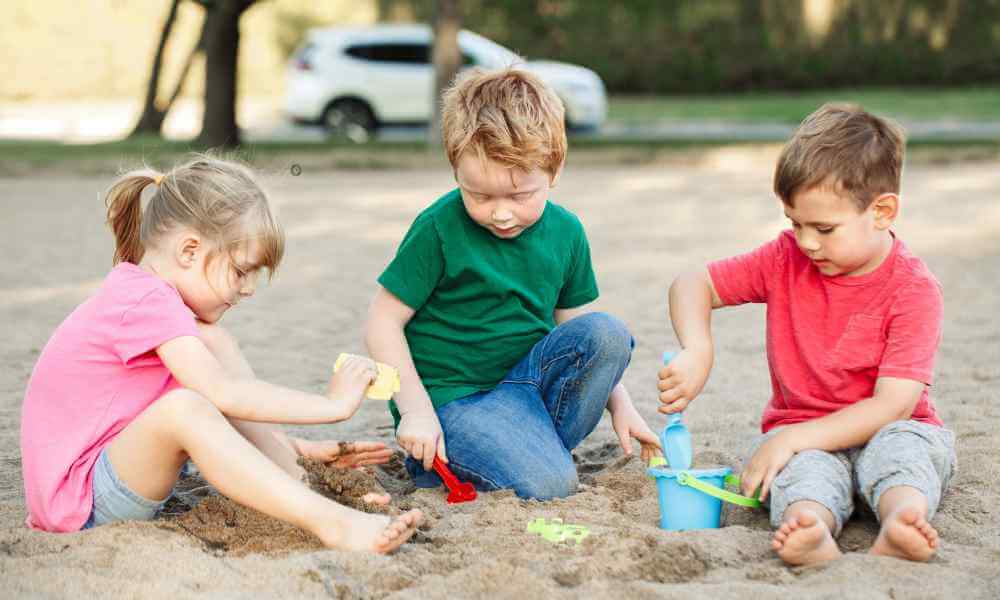Self help skills for 4-5 year olds- Dear parents, Today we are going to go on an amazing journey, where we will learn how to make your little ones master self-help skills.
Have you ever thought that when your children help themselves, how do they accept themselves and feel confident in themselves? This age of 4-5 years is a very important time for children, where they realize their independence.
And in this blog post, we will tell you some tips and activities that you can do with your children to enhance their self-help skills. So, get ready for a new journey with your children.
The Power of Independence
self-centeredness plays a major role in childhood, and this feeling often affects our entire life. When we teach our young children the importance of self-care and teach them how to help themselves, we provide them with a sense of worth and self-confidence.
Children aged 4-5 years begin to understand themselves and form their identity. When they handle tasks like dressing themselves, making their bed, or serving their food, it boosts their self-esteem and confidence. This makes them feel like they are understanding themselves and exploring their capabilities.
One of the main benefits of Focusing on Self is that children realize their own importance. When they are successful in doing something themselves, they get a sense of accomplishment.
It increases their self-worth and self-respect. Every small success, like putting on their own shoes or cleaning up their own toy, gives the child a positive outlook and teaches them that they can do anything in life.
Furthermore, when children realize their own interests, they become aware of their capabilities and limitations. When they are learning something new, they try to improve their skills. In this process, they begin to understand themselves better and evolve their personality.
Teaching children the values of Focus on Self lays a strong foundation in their lives. When they complete small tasks successfully, it builds their confidence, and they feel that they are not failures in life.
This is an important milestone in their life, which prepares them for future challenges. (self help skills for 4-5 year olds)
Now you might be wondering how we can explain the feeling of self-centeredness to our children. A simple way is to give them small tasks, such as getting dressed, making their bed, or cooking their own food.
Support them when they’re learning something new, and inspire them when they’re trying something new. These activities can become a fun and educational experience for them, which will help in enhancing their self-help skills.
So remember, when we teach our children to try things themselves, we provide them with a strong foundation that is essential for their future. This helps in making them a reliable and self-respecting person, which is an extremely valuable asset for them.
Developing Self-Care Habits

Developing self-care habits in your little ones is an important step for their future. When children develop the habit of taking care of themselves, it improves their physical, mental, and emotional well-being.
At this age, it is important for us to explain to children why it is important to take care of their health and hygiene.
To develop good self-care habits, we must provide our children with regular routines and structure. This helps the child understand what they have to do and when to do it.
For example, teach them to bathe, brush teeth, and eat meals at a fixed time every day. This also improves their discipline and they feel a sense of control in their life.
Another way to promote self-care habits is to appreciate and reinforce good habits. When kids take care of themselves, praise and acknowledge their effort. This increases their confidence and motivation and they feel that their efforts are being appreciated.
We should also help our children understand the difference between right and wrong. Teach them which foods are good for them and which activities are beneficial for them.
This way, they can understand themselves better and learn to take their decisions wisely. (self help skills for 4-5 year olds)
Additionally, we should encourage children to make self-care activities fun and interesting. For example, motivate them to brush or bathe with their favorite cartoon characters. This helps the child realize that self-care is an enjoyable and essential part of their daily routine.
So remember, teaching children self-care habits is a gradual process. We need to be patient and consistent and keep supporting them as they learn new skills. When we teach self-care habits to our children, we prepare them for a healthy and happy lifestyle, which is essential for their overall development.
Read Also: 101 ways to take care of yourself when the world feels overwhelming
Mastering Basic Hygiene

It is very important for us to make children understand the importance of basic hygiene and make them masters in it. Teaching basic hygiene to 4-5 year old children is a crucial step for their health and well-being.
At this age, it is important for them to understand the importance of bathing properly, brushing their teeth, and keeping their surroundings clean.
Teaching children how to bathe properly creates a good habit for them. We should show them how to bathe and what products to use. With this their skin and body can be taken care of.
We can explain to them how important it is to use hot water and soap so that they can avoid any kind of germs.
Developing the habit of brushing teeth is also an important aspect of basic hygiene. Explain to children the importance of brushing twice daily and show them how to brush properly.
We should tell them that good dental hygiene can prevent cavities and gum disease, and will help maintain their oral health. (self help skills for 4-5 year olds)
Apart from this, we should teach children that it is important to take care of the cleanliness of their surroundings. Explain to them how to clean their toys and keep their personal space tidy.
This makes it their habit to keep their environment clean and organized, which improves their overall well-being.
Also, we should encourage children to make hygiene practices fun and interesting. We should teach them in a creative way that doing hygiene cannot be boring but an enjoyable activity.
For example, motivate them to brush or bathe with their favorite cartoon characters. In this way, by maintaining their interest, we can easily teach them the right habits.
So remember, teaching basic hygiene habits is a gradual process. We work with patience and consistency to help children understand the difference between right and wrong and adopt proper hygiene habits.
When we make our children master basic hygiene, we prepare them for a healthy and happy lifestyle, which is essential for their overall development.
How do you teach self-help skills?
Embracing Emotional Intelligence
It is very important for us to explain to children the importance of emotional intelligence and how to make them master it. At 4-5 years of age, children begin to understand and behaviorally express their emotions.
During this time, it is important for them to learn to manage their emotions and behave intelligently with others.
Teaching emotional intelligence is a crucial aspect of children’s mental and social development. Children should be taught that every emotion has a meaning and it is important for them to understand why they are feeling.
With this, they can understand their emotions better and learn the right way to express their feelings. (self help skills for 4-5 year olds)
We should teach children how to express their emotions properly and try to understand the emotions of others. This helps them develop empathy and compassion, which strengthens their interpersonal relationships.
We teach them how conflict situations can be resolved peacefully and teach them techniques to control their emotions.
One key way to promote emotional intelligence is to encourage them to express their emotions freely. Children shouldn’t be afraid to share their feelings, and we should try to listen and understand them when they express their feelings.
This makes them feel confident in handling their emotions and their self-esteem also increases.
Also, we should teach children how to manage their negative emotions. Teach them coping skills and stress management techniques, such as deep breathing or positive self-talk. This will help them reduce their stress and anxiety and improve their overall well-being.
So remember, developing emotional intelligence is a gradual process. We work with patience and empathy to help children understand and manage their emotions. When we help our children embrace emotional intelligence, we prepare them for a healthy and balanced emotional life, which is essential for their overall development.
Building Social Skills

It is very important for us to make children understand the importance of social skills and how to develop them. At ages 4-5, children begin to learn how to be active in their social interactions and behave intelligently with others. During this time, they also need to improve their communication skills and engage in teamwork. (self help skills for 4-5 year olds)
Teaching social skills is a crucial aspect of children’s interpersonal relationships. Children need to be taught how to interact with others in a respectful and empathetic manner. This helps them form good bonds with their peers and create a healthy social environment.
We should encourage children to actively participate in social activities and collaborate with others. This helps them understand the importance of teamwork and cooperation and improve their social skills. We teach them how to share with others, compromise, and the importance of understanding others’ feelings.
One key way to promote social skills is to give them opportunities to practice in social situations. Encourage children to participate in playdates or by taking them to public places. This allows them to meet new people and further improve their social skills. We teach them how to interact with a new person and maintain a friendship.
Also, we should teach children how to behave intelligently with their peers. Teach them how to try to understand the feelings and perspectives of others and how to express their opinions respectfully. This makes them feel confident and comfortable in their social interactions.
So remember, developing social skills is a gradual process. We work with patience and encouragement to guide children in their social interactions. When we help our children embrace social skills, we prepare them for a healthy and fulfilling social life, which is essential for their overall development. (self help skills for 4-5 year olds)
Self Care After A Miscarriage: Healing Your Heart and Mind
Encouraging Problem-Solving
It is very important for us to explain to children the importance of problem solving and encourage them in it. At the age of 4-5 years, children face different situations in their daily life and it is important for them to learn to find solutions to them.
During this time, it is important for them to develop the ability to solve their problems creatively and effectively.
Teaching problem solving skills is a crucial aspect of children’s overall development. Children should be taught that every problem has a solution, and how they can choose the right solution by exploring their options. This makes them feel confident in facing their challenges and increases their resilience.
We should encourage children to approach their problems calmly and systematically. For this, we teach them how to break down the problem and evaluate possible solutions. With this, they improve their analytical skills and learn problem solving from a structured approach.
One key way we promote problem solving is by giving them opportunities to practice in practical situations. Give children the opportunity to develop their problem-solving skills by involving them in real-life scenarios. With this they will be able to implement their solutions and test their abilities.
Also, we should teach children not to be afraid of failure, rather they should learn something new from every mistake. Encourage them to be inspired by their mistakes and not give up in any situation. This helps them maintain their confidence and further improve their problem solving skills.
So remember, developing problem solving skills is a gradual process. We work with patience and encouragement to guide children to effectively solve their problems. When we help our children embrace problem solving skills, we make them confident and resourceful individuals, ready to face every challenge. (self help skills for 4-5 year olds)
Fostering Creativity and Imagination

It is very important for us to explain the importance of creativity and imagination to children and find a way to encourage them in it.
At the age of 4-5, children see the world through their diverse imagination and creative abilities. During this time, it is important to give them the opportunity to explore their own ideas and seek new experiences.
Teaching creativity and imagination is a crucial aspect of children’s cognitive development. Children should be taught that it is important to see a different perspective in every situation and express their thoughts freely. This helps them improve their problem solving skills and develop their unique perspective.
We should encourage children to explore their creative ideas and treat their imagination with limitless boundaries.
To this end, let us give them the opportunity to engage in open-ended activities and art projects. This gives them an opportunity to express their creativity and enhance their artistic abilities.
One key way we foster creativity and imagination is to provide them with diverse experiences and learning opportunities. Encourage children to explore new places, read books, and participate in different activities. With this they broaden their horizons and develop their imagination further.
Also, we should teach children to implement their creative ideas and express them in a tangible form. Encourage them to showcase their creativity through their drawings, stories, or music. With this they promote their self-expression and boost their confidence.
So remember, nurturing creativity and imagination is an ongoing process. We work with patience and encouragement to guide children in their creative endeavors.
When we help our children embrace creativity and imagination, we raise them to be innovative and self-expressive individuals who see the world in their own unique way. (self help skills for 4-5 year olds)
154 Self-Care Journal Prompts To Nurture Your Well-being
Learning Through Play
It is very important for us to make children understand the importance of sports and fun and how to involve them in learning. At 4-5 years of age, children play with curiosity and discovery, exploring the world.
During this time, it is important for them to understand new concepts and develop skills through sports.
Learning through play is a natural and effective way for the overall development of children. Children should be taught that every activity is an opportunity to learn. This engages their senses and enhances their cognitive, motor, and social skills.
We should encourage children to be creative and exploratory in their sports. For this, we provide them with diverse toys, games, and activities that awaken their curiosity and help them develop problem-solving and decision-making skills.
One key way to promote learning through play is to provide them with open-ended play opportunities. Children should be given unstructured playtime where they can play using their imagination. With this they encourage their creative thinking and pursue their interests.
Additionally, we must teach children how to relate real-life concepts and skills to their play experiences. With this they make their learning meaningful and learn how to apply it in their daily life.
For example, if they are playing with blocks, they get an opportunity to understand the concepts of shapes and sizes.
So remember, learning through play is a dynamic and engaging process. We work with patience and observation to guide children through their activities.
When we help our children embrace learning through play, we provide them with a joyful and effective learning experience, which is essential for their overall development. (self help skills for 4-5 year olds)
Cultivating Patience and Persistence
It is very important for us to make children understand the importance of patience and continuous hard work and how to make them masters in it.
At the age of 4-5, children are learning new skills and facing challenges, and they need to learn how to reach their goals through perseverance and consistent hard work.
Learning patience and persistence is an important aspect of children’s personal development. Children should be taught that learning or acquiring anything new takes time, and that they should take each step slowly and carefully. This keeps them determined and focused to achieve their goals.
We should encourage children not to give up and be persistent in facing their challenges. For this, we support and motivate them to work hard to reach their goals. With this they develop their self-discipline and self-control.
One key way to develop patience and persistence is to give them opportunities to celebrate gradual progress.
Teach children how every small success acknowledges their hard work and inspires them to move forward towards their goals. With this they increase their self-esteem and maintain their self-confidence.
At the same time, we must teach children how to overcome their setbacks and give them the opportunity to learn from their mistakes. This improves their resilience and problem-solving skills and turns every challenge into a new opportunity.
So remember, developing patience and persistence is an ongoing process. We work with consistency and encouragement to guide children towards their goals.
When we help our children embrace perseverance and persistence, we raise them to be determined and resilient individuals, ready to pursue their dreams. (self help skills for 4-5 year olds)
Nurturing Healthy Eating Habits

It is very important for us to inculcate healthy eating habits and make them understand the importance of nutritious food choices.
At the age of 4-5 years, children shape their dietary habits and it is important for them to consume nutritious foods for their growth and development.
Learning healthy eating habits is an important aspect of children’s physical and mental well-being. Children should be taught how to get balanced nutrients at every meal and reduce the intake of junk food and processed foods. With this they maintain their energy levels and boost their immunity.
We should encourage children to consider every meal as an opportunity to provide nutrition to their bodies. For this, we teach them about the importance of diverse fruits, vegetables, grains, and proteins. With this they select their food choices consciously and healthily.
One of the main ways to nurture healthy eating habits is to make them understand the importance of family meals.
Teach children how attending a family meal is an opportunity for bonding and socializing, as well as part of a healthy diet. With this they strengthen their relationships and also improve their eating habits.
Also, we should teach children how to practice portion control and mindful eating. Encourage them to listen to their hunger signals and eat until they are truly hungry. With this they avoid overeating and maintain their weight.
So remember, nurturing healthy eating habits is a lifelong journey. We work with consistency and positive reinforcement to explain to children the importance of nutritious food choices and a balanced diet.
When we help our children embrace healthy eating habits, we prepare them for a healthy and energetic lifestyle, which is essential for their overall development. (self help skills for 4-5 year olds)
Exploring the World Around
It is very important for us to make children understand the importance of exploring the world around them and make them curious and inquisitive.
At ages 4-5, children broaden their understanding and knowledge by interacting with new experiences and environments. During this time, it is important to give them a chance to discover the wonders of their surroundings and satisfy their curiosity.
Exploring their surroundings is an important aspect of children’s overall development. Children should be taught that everything in the world has its own meaning and they should explore new concepts and ideas by following their curiosity. With this they develop their observation skills and expand their knowledge.
We should encourage children to go out of their homes and explore new places. For this, we motivate them to go for nature walks, zoo visits, and local parks. With this they get a new perspective on their environment and engage their senses.
One of the main ways we explore our surroundings is to allow them to ask open-ended questions. Encourage children to share their observations and ask questions out of curiosity. With this they enhance their critical thinking and communication skills and deepen their knowledge.
Also, we should teach children how to appreciate their discoveries and give them the opportunity to learn from their experiences. With this they maintain their sense of wonder and make their learning a lifelong journey.
So remember, exploring the world around is an endless and enriching experience. We guide children through their environments while encouraging curiosity and exploration.
When we help our children explore their surroundings, we raise them to be curious and informed individuals who have a way of looking at the world. (self help skills for 4-5 year olds)
Introducing Basic Chores
It is very important for us to consider children as basic thieves and involve them in household responsibilities. At the age of 4-5, children develop their independence and sense of responsibility, and it is important to reinforce these skills through basic chores.
Learning basic chords is an important aspect of children’s character building and self-reliance.
Children should be taught that each member has a role to play in the maintenance of the household, and that they should value their contributions. Through this they develop their teamwork and time management skills.
We should encourage children to perform their age-appropriate chores on a regular basis. For this, we assign them simple tasks such as cleaning their toys, making their bed, or setting the dining table. With this they experience their sense of accomplishment and boost their self-esteem.
One key way to introduce basic chores is to give them positive reinforcement and praise for their efforts. Teach children how their contributions are appreciated and how important their role is in the smooth functioning of the household.
With this they understand their sense of responsibility and perform their tasks willingly.
Also, we must teach children how to organize their chores and incorporate them into a routine. With this they improve their time management skills and manage their responsibilities efficiently.
So remember, introducing basic thieves is a gradual and rewarding process. We work with patience and encouragement to guide children in their journey. When we help introduce basic skills to our children, we give them a sense of ownership and accountability, which is important for their overall development. (self help skills for 4-5 year olds)
Promoting Confidence and Self-Esteem

It is very important for us to explain to children the importance of self-confidence and self-respect and to encourage them in this.
At ages 4-5, children are shaping their self-identity and self-worth, and they need positive reinforcement and support to build their confidence and self-esteem.
Promoting confidence and self-esteem is an important aspect of children’s mental and emotional well-being. Children should be taught to recognize their strengths and talents and accept their areas to grow.
This helps them appreciate their unique identity and express their abilities confidently.
We should encourage children to celebrate their accomplishments and acknowledge their positive qualities. For this, we give them praise and encouragement for each milestone and achievement. With this they recognize their self-worth and reinforce their self-confidence.
One of the main ways we promote self-confidence and self-esteem is by giving them opportunities to face challenges. Encourage children to go outside their comfort zone and explore new experiences. With this they test their capabilities and strengthen their self-confidence.
Also, we should teach children how to learn from their mistakes and how to handle their failures. Through this they develop their resilience and maintain their self-respect. We inspire them to never give up on their dreams and goals and to always maximize their potential.
So remember, promoting confidence and self-esteem is an ongoing process. We work with positivity and encouragement to support children in their self-belief and self-worth.
When we help our children embrace confidence and self-respect, we raise them to be strong and self-assured individuals, ready to chase their dreams. (self help skills for 4-5 year olds)
Managing Big Emotions
It is very important for us to explain to children the importance of managing big emotions and how to support them in this. At ages 4-5, children develop the skills to understand and regulate their emotions, and they need to know effective coping mechanisms.
Managing big emotions is an important aspect of children’s emotional intelligence and mental well-being.
Children should be taught that every emotion has a healthy outlet, and they should know the appropriate ways to express their feelings. With this they maintain their relationships and build their emotional resilience.
We should encourage children to explore their feelings open-mindedly and non-judgmentally. To do this, we teach them how to understand emotional vocabulary and label their feelings. With this they enhance their emotional awareness and become skilled in identifying their emotions.
One of the main ways we manage big emotions is to teach them constructive coping strategies. Teach children how they can express their emotions through art, writing, or physical activities such as exercise. With this they release their stress and regulate their emotions.
Also, we should teach children how to communicate their emotions and ask for support from others when they feel overwhelmed. With this they improve their social skills and strengthen their relationships. We encourage them to share their emotions and cultivate empathy and understanding.
So remember, managing big emotions is an ongoing learning process. We work with patience and empathy to guide children through their emotional experiences.
When we help our children manage big emotions, we raise them to be emotionally resilient and socially adept individuals who prioritize their emotional well-being. (self help skills for 4-5 year olds)
Preparing for School and Beyond

It is very important for us to prepare children for school and life ahead. At the age of 4-5, children begin their educational journey, and are given the opportunity to develop academic skills as well as life skills.
Being prepared for school and life ahead is an important aspect of children’s overall development. Children should be taught how to strengthen their academics as well as social skills, communication skills, and problem-solving skills.
With this, they face the challenges of their future confidently and are ready to achieve their goals.
We should encourage children to take active participation in school and enjoy their learning. For this, we motivate them to get involved in academic subjects as well as extra-curricular activities. With this they explore their interests and enhance their skills.
One of the main ways we prepare students for school and beyond is by teaching them time management and organizational skills. Teach kids how to prioritize their tasks and manage their schedules. With this they achieve their academic and personal goals and handle their responsibilities efficiently.
Also, we should teach children how to set their goals and put in consistent efforts to make them persist. Through this they develop their self-discipline and pursue their aspirations. We motivate them to chase their passions and strive to fulfill their dreams.
So remember, getting ready for school and life ahead is an ongoing journey. We work with encouragement and guidance to support children to reach their educational and personal goals.
When we prepare our children for school and life ahead, we raise them to be confident and resilient individuals, fully equipped to tackle the challenges of their future. (self help skills for 4-5 year olds)
Conclusion
In this blog post, we focused on the importance of self-help skills for 4-5 year old children and how to develop them.
In each section we explored in detail how children can develop independence, self-care habits, basic hygiene, emotional intelligence, social skills, problem-solving, creativity, learning through play, and healthy eating habits. , exploration of the world around, basic tasks, self-confidence and self-esteem, and guidance on managing big emotions.
These skills are important for children’s overall development and prepare them for success in their future. We’ve found that by working with patience, encouragement, and positive reinforcement, we can help children embrace these skills.
It is our responsibility to guide children to explore their potential and nurture their unique talents. When we empower our children to develop their skills and abilities, we lead them towards a bright, confident, and resilient future. (self help skills for 4-5 year olds)
I hope you have liked the information we have shared in our article, to know more about this you can read our other article too.
If you want to know anything else or have any questions, you can ask me. Thank you.
Facts & Stats on self help skills for 4-5 year olds
- Early Development Matters: Studies show that children who develop strong self-help skills at a young age are better prepared for academic success. A longitudinal study by Fryar, Alexander & Lei, Helen found that strong self-regulation skills in kindergarten predicted higher math and reading achievement in later grades. This is because self-help skills foster independence, build confidence, and promote a growth mindset.
- Building Emotional Intelligence: Self-care habits like dressing independently and managing emotions contribute to a child’s emotional intelligence. According to the Collaborative for Academic, Social, and Emotional Learning (CASEL), social-emotional learning (SEL) is critical for school readiness and overall well-being. You can visit the CASEL website to learn more about the importance of SEL: https://casel.org
- Lifelong Benefits: Learning self-help skills in early childhood sets the stage for future success. A study by Mischel, Walter & Aycock, Edgar: https://psycnet.apa.org/record/1988-23802-001 at the University of Oregon found that children with strong self-regulation skills are more likely to graduate high school and have higher paying jobs as adults.
Resources for Parents and Caregivers
- The National Association for the Education of Young Children (NAEYC): https://www.naeyc.org NAEYC offers a wealth of resources on early childhood development, including tips on fostering self-help skills.
- Zero to Three: https://www.zerotothree.org Zero to Three is a leading nonprofit focused on the development of babies and toddlers. Their website provides articles and guidance on promoting self-help skills in young children.
- The American Academy of Pediatrics (AAP): The AAP website offers a variety of resources on healthy childhood development, including information on social-emotional development and self-care skills. (self help skills for 4-5 year olds)
FAQs – Frequently Asked Questions
How can independence be taught to 4-5 year old children?
To teach children independence, they can be given the opportunity to develop decision-making and problem-solving skills by assigning them age-appropriate tasks and responsibilities. Working with regular encouragement and positive reinforcement, children discover their abilities and gain independence.
How can healthy eating habits be fostered?
To develop healthy eating habits, children can be encouraged to consume diverse and nutritious foods. They can explain the importance of fruits, vegetables, whole grains, and a protein-rich diet. Creating family meals and a positive food environment can help children foster healthy eating habits.
What are the strategies to develop emotional intelligence?
To develop emotional intelligence, children can be taught how to recognize and express their emotions. They can be taught the importance of empathy and emotional regulation, and can also be taught effective communication and problem-solving skills.
How can children benefit from play-based learning?
Play-based learning is a natural and fun way to promote children’s learning and development. Children can be provided with open-ended toys and creative activities that encourage them to explore and experiment. Additionally, their curiosity can be stimulated by taking them on cherished nature walks, museum visits, and interactive exhibits.
Are children required to join Chores?
Yes, it is important for children to join forces as it develops their responsibility and life skills. By assigning age-appropriate chores, children learn teamwork, self-discipline, and time management skills. Apart from this, performing chorus also increases children’s self-esteem and sense of accomplishment.